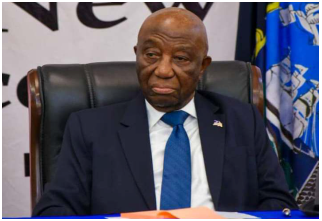Will Boakai Succeed In Relocating Monrovia? -As Senators Initiate Discussion
By Bill W. Cooper
The Liberian Senate has initiated discussions on the possibility of relocating Monrovia on grounds that the city has surpassed the existing population it was originally intended for.
The move comes as a response to the rapid urbanization and population growth that Monrovia has experienced in recent years, leading to overcrowding, inadequate infrastructure, and environmental degradation and severe flooding in recent months.
Monrovia, named after former US President James Monroe, was established as the capital of Liberia in 1822 by the American Colonization Society (ACS) as a settlement for freed African-American slaves.
Over the years, the city has grown into a bustling metropolis and the political, economic, and cultural center of the country but the rapid population growth and urbanization have put a strain on the city’s resources and infrastructure thus leading to various challenges such as traffic congestion, inadequate housing and limited access to basic services and flooding.
Flooding in the Liberian capital Monrovia and leeward areas during every rainy season usually displaces thousands of citizens, leaving them to fetch for shelter at neighbour or relatives’ homes.
It can be recalled that more than a decade ago, former President Ellen Johnson Sirleaf pronounced the need for the construction of a new capital city, but no actions were taken to make the construction of the new capital a reality in Zekepa, Nimba County.
But debating a report from its joint committee on Public Works and Rural Development, Lands, Mines and Energy, Natural Resources and Environment and Public Corporations recently, the senators said consistent flooding has greatly affected their constituents.
They also attributed the continuous flooding to lack of political will from the executive to implement the zoning law, aged-old sewage system, construction on alleyways, poor planning and drainage system, amongst others.
The senators further raised concerns about the unsustainable growth of Monrovia and the need to explore alternative options for the country’s capital, highlighting the challenges facing the city and emphasized the importance of planning for the future.
They further requested for the appearance of the Minister and Director of the Ministry of Public Works, Environment and Protection Agency (EPA) and the National Disaster Management Agency (NDMA) to outline plans and provide statistics that would lead to the formulate of a plan and draft budget to address the issue of flooding across Liberia.
“We cannot continue to ignore the fact that Monrovia has outgrown its capacity and is no longer able to adequately serve the needs of its residents. We need to start thinking about the long-term sustainability of our capital city and consider relocating it to a more suitable location.
“But it will not happen overnight even if we find oil today in Liberia. It will take intentional actions. Liberia is the oldest country in Africa and we cannot be calling Monrovia a city every other time. We need to move out of Monrovia,” Senator Numene Bartekwa asserted.
According to the Grand Kru County Senator, the lack of implementation of the zoning law continues to contribute to over flooding, not only in Monrovia, but other parts of the country.
“The Ministry of Public Works should take full charge of the zoning law of this country. Our problem is the lack of the enforcement of appropriate laws. Agencies that are responsible to enforce laws just sit down and those laws are violated,” he added.
The Chairman of the Senate Committee on Lands, Mines and Energy, Simeon Taylor, claimed that national leaders continue to exhibit the spirit of “fear” in finding solutions to problems confronting the country and the masses.
According to him, Liberia will not move forward in terms of growth and development if its national leaders fail to take actions due to political reasons, and asserted that the construction of a new capital city would not require more time or money, but the willingness to do so is currently lacking among national leaders.
“We cannot build a city without a plan. There must be rules and regulations governing a city but we do not have it and every day we complain about the problems we have. We are so afraid and we are making lots of mistakes. We need to be straight to work.
And on a serious note, ordinary Liberians are the ones that are mostly affected from flooding and as such, national leaders should be courageous to do the right thing for the benefit of the citizens,” Taylor added.
Meanwhile, other Liberians have raised questions about the feasibility and practicality of relocating the capital city, pointing out the significant costs and logistical challenges involved in such a massive undertaking.
They argued that instead of moving the capital, the government should focus on improving infrastructures and services in Monrovia to address the current challenges facing the city, questioning which county to host city.
“The idea of relocating the capital city is ambitious but unrealistic given the financial constraints and technical challenges involved. We should focus on addressing the existing problems in Monrovia and improving the quality of life for residents rather than embarking on a costly and uncertain relocation project,” they added.
Meanwhile, as the discussions on relocating the capital city continue, some Liberians are hopeful that a new capital city could bring about positive changes and opportunities for the country, while others are skeptical about the practicality and implications of such a move.
The decision on whether to move the capital city will also require careful consideration, planning, and consultation with all stakeholders to ensure that it serves the best interests of the country and its people.
In the coming months, the Senate is expected to continue its discussions on the proposal to relocate the capital city and to engage with experts, stakeholders, and the public to gather input and feedback on the potential move.

